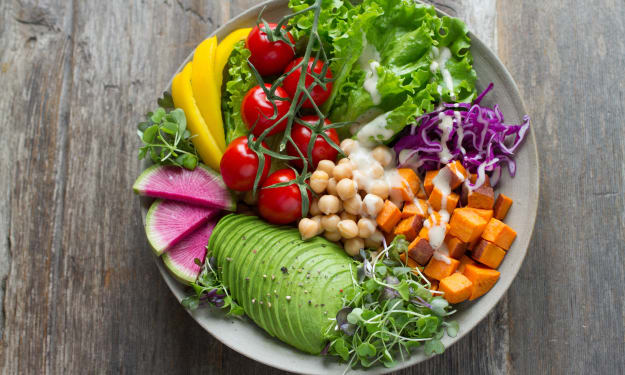Top Misconceptions About Plant-Based Diets
From protein deficiency to plants feeling pain, it's time to de-bunk!

Vegan diets lack protein
I personally love this one, because according to many studies, plant-based diets tend to contain more protein on average than that of an omnivore. (1) Plants contain all essential amino acids (the building blocks of protein) to help you reach the required protein levels for an adult, however, the most protein dense plants tend to be nuts and legumes.
Ethically it's just as wrong to eat plants as they also feel pain just like animals
Fortunately for us, plants do not have central nervous systems. There is currently no scientific research that proves they experience suffering like sentient beings do, however they do respond to their environments, for e.g., being exposed to sunlight, H2O or harsh chemicals, but that does not necessarily mean they suffer 'pain' in the process. Ridiculing a diet based on an opinion backed by no scientific research is known to be a type of gaslighting, and for the sake of healthy debate in this area of study, it is important to ensure proper research is conducted prior to such debate. Furthermore, if one were to not eat plants, as they believe they feel pain, one should also not eat animals as animals eat plants as their primary source of food.
Plant-based diets lack adequate nutrients for optimal health
According to the 'Academy of Nutrition & Dietetics' (2), appropriately planned vegan diets are healthful, nutritionally adequate and may provide health benefits for the prevention and treatment of certain diseases. These diets are appropriate for all stages of the life cycle, including pregnancy, lactation, infancy, childhood, adolescence, older adulthood, and for athletes. 'Dieticians of Canada' state that a well planned vegan diet can meet all of these needs. It is safe and healthy for pregnant and breastfeeding women, babies, children, teens, and seniors. The 'British Nutrition Foundation' claim that a well-planned, balanced vegetarian or vegan diet can be nutritionally adequate. Studies of UK vegan children reveal that their growth and development are within the normal range. The 'Dieticians Association of Australia' also states that despite the restriction of animal products in a vegan diet, with good planning it is still possible to obtain all the nutrients required for good health. If you are worried and don't want to routinely have your blood tested, there are apps such which allow you to input your daily food and drink intake and track your macro/micronutrient levels in accordance with RDI's.
We have teeth designed for eating meat
Contrary to popular belief, we do not have the same teeth as a carnivorous animal. Our teeth are more or less flat. Some herbivores, such as Gorillas and Hippopotamus', do in fact have teeth similar to that of a carnivorous animal, however, we do not possess that trait, nor do we have claws or the typical, highly sensitive sense of smell that predator usually has. 'Nature fallacy' refers to the school of thought where just because it happens in the wild, then humans should do it too. This school of thought is wrong in our modern day society on many levels, the first reason being; we are not animals living in the wild. Unless you are living in a remote part of the world that depends on hunting and gathering to survive, then no, the killing of animals is not necessary for us to live.
Animals are not sentient, therefore we should be able to kill them for food
According to the 'Cambridge Declaration on Consciousness', animals are in fact sentient. (3) "The weight of evidence indicates that humans are not unique in possessing the neurological substrates that generate consciousness. Nonhuman animals, including all mammals and birds, and many other creatures including octopuses, also possess these neurological substrates."
If we didn't live in modern day society, and you were stranded on a deserted island, you'd have to eat meat
If there were in fact animals living on that island, then it is very likely the stranded human could eat what that animal is eating. The logical question is not so much, "what would you eat on a deserted island...", but rather, "What if you lived in a civilisation where there is an abundance of food of all kinds, including those that mock the exact taste of meat and dairy without having to harm animals AND you could be at your optimum state of health, would you choose to kills animals for no reason?"
Eating Plant-based makes you weak
5 time World Champion Formula One Racecar Drive; Lewis Hamilton
America's first vegan bodybuilding champ; Kenneth G Williams
'Germany's Strongest Man', world record holding StrongMan, vegan strongman competitor; Patrik Baboumian
Vegan bodybuilder; Torre Washington
Record-holding Ultramarathoner; Scott Jurek
Boxing heavyweight title contender; Bryant Jennings
Linebacker, Tennesse Titans; Derrick Morgans
2 x 400m Champion; Morgan Mitchell
American Record Holding weightlifter; Kendrick Farris
Professional Vegan Surfers; Tia Blanco, John John Florence, Alana Blanchard, Jack Freestone, Nikki Van Dijk, Dave Rastaovich, Rob Machado,
And the list goes on..
References
1. https://www.sciencedirect.com/science/article/pii/S0065242309470070
2. https://www.eatrightpro.org/~/media/eatrightpro%20files/practice/position%20and%20practice%20papers/position%20papers/vegetarian-diet.ashx
3. http://fcmconference.org/img/CambridgeDeclarationOnConsciousness.pdf
About the Creator
Jackie Green
Full time Research & Development Manager (sports supplements)
Plant based Nutritionist
Passionate about sharing unbiased nutrition information
Wishing you happiness, health and longevity! :)
Enjoyed the story? Support the Creator.
Subscribe for free to receive all their stories in your feed. You could also pledge your support or give them a one-off tip, letting them know you appreciate their work.






Comments
There are no comments for this story
Be the first to respond and start the conversation.